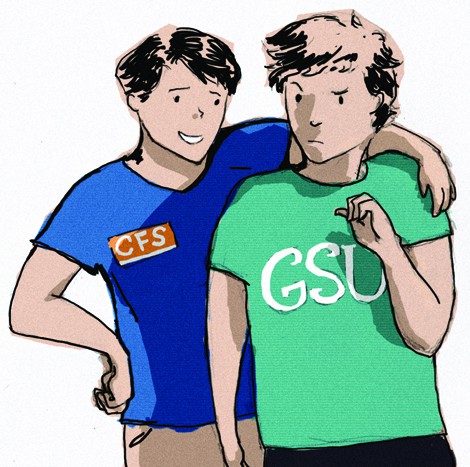At the beginning of this academic year, the University of Toronto Graduate Students’ Union (GSU) was among a number of student unions in Canada whose members circulated a petition on whether to hold a referendum on continued membership in the Canadian Federation of Students (CFS). To be valid under the CFS’s bylaws, the petition had to be signed by at least 20 per cent of the GSU membership. After lengthy consultations between the CFS, GSU, and U of T administration, the petition was turned over to professional services firm Deloitte to assess its legitimacy. The CFS provided the terms for the assessment. In accordance with these terms, Deloitte determined that the petition lacked the required number of authenticated signatures to pass, by a threshold of less than two per cent.

MARI ZHOU/THE VARSITY
The petition in question is only the most recent act of defiance by the GSU and its members, which in the past has led protests outside the CFS’s Annual General Meeting. This most recent derailment follows a years-long struggle between the CFS and the GSU, among other student unions and associations in Canada. The circulation of the petition was partially a response to the CFS’s failure to adopt a series of internal reforms presented in November of 2012, and again in May of last year, sponsored by the GSU.
The proposed reforms reflect the broad concerns of student leaders regarding the CFS’s detachment from its members, and its disregard for democratic practices. In order to achieve transparency, students sought a detailed budget from the CFS, which would outline the salaries of executive board members, and the money spent on legal cases against its members.
They also proposed reforming Bylaw 1, which governs how member organizations join and leave the federation. The bylaw currently requires that 20 per cent of members must sign a petition to hold a referendum to leave the CFS, while only 10 per cent are required to join. The percentage required to exit the federation was doubled following the receipt of several petitions to decertify in 2008 and 2009. This change serves to create another imbalanced institutional barrier to groups trying to leave the federation.
U of T’s GSU is only one of many unions and associations across Canada whose members circulated petitions and advocated for defederation this year. The retaliatory patterns of the CFS have intimidated many groups out of taking similar action, for fear of legal recourse. The CFS is currently engaged in litigation with the Post-Graduate Students’ Society at McGill, as well as the Graduates Students’ Association and Concordia Students’ Union at Concordia University, over the validity of their 2010 decertification referenda.
The CFS’s reaction to defederation attempts have been perverse and self-defeating. When a democratic and responsive organization finds that a significant and vocal group of its members are unhappy, it should — at the very least — make an effort in good faith to understand these grievances, and work to resolve them. This is the most effective method of conciliating disgruntled members, and strengthening the organization. The CFS’s combative approach has done the opposite. When presented with a petition, the CFS’s first response should not be to nitpick over technicalities — whether petitions were received by registered mail; whether signatures were valid; whether the petition represented 19 or 20 per cent of the membership. The first response should be, regardless of the technicalities, why did students sign this petition, and what can we do to address their concerns?
The CFS is meant to organize students across Canada in the pursuit of better, more accessible education — something surely all students can agree on. These ongoing disputes detract from those efforts. They serve only to further divide the federation’s membership and distract from substantive issues.
The CFS is charged with the democratic representation and organization of students across Canada — yet it continually ignores the voices of students who object to the form of that representation.
Rather than listening to disgruntled members, the CFS invests its energy and resources in obstructing these movements, first by picking at procedural minutiae, and, if that doesn’t work, through litigation. Rather than work to impede referenda, the CFS would be better served by adopting a conciliatory approach. By addressing the issues at hand and engaging students in a genuine conversation, it might still be able to keep the federation intact. However, if the CFS continues with its current practices, unions like the GSU will eventually find a way out — and, hopefully, mobilize with other unions across Canada to form a more open and democratic medium that betters represent students.

